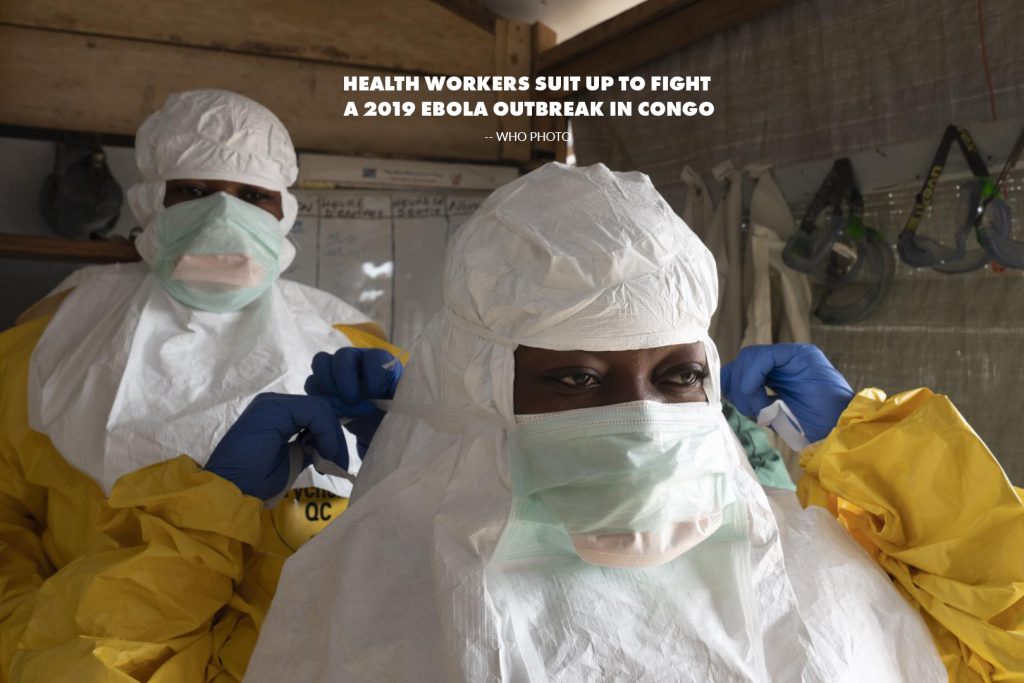Kenya’s ministry of health Wednesday released a statement asking the population to be alert against any signs of Ebola. The deadly, highly contagious viral disease was confirmed in Uganda on Tuesday.
Uganda’s ministry of health confirmed the Ebola Virus Disease (EVD) outbreak in Mubende, a district located about 159 kilometers west of the capital Kampala.
WHO said eight people with suspected Ebola symptoms are receiving medical care. Meanwhile, the global health body has said it will send its staff to the affected area for heightened monitoring and care provisions.
“Thanks to its [Uganda] expertise, action has been taken to quickly detect the virus, and we can bank on this knowledge to halt the spread of infections,” said Dr. Matshidiso Moeti, WHO regional director for Africa.
According to the ministry of health in Uganda, the confirmed case is a 24-year-old male resident of Ngabano village of Madudu Sub County in Mubende District. The patient who showed symptoms of Ebola later died.
Uganda’s health ministry said it had dispatched medical teams to Mubende District to enhance surveillance and community awareness. It also urged the public to remain vigilant and calm as teams undertake the necessary action.
The Ugandan clinical team took off samples for testing at UVRI. Results confirmed that the patient was positive for the Ebola-Sudan strain. Uganda last reported an outbreak of the strain in 2012.
The East African country has also appealed to the public to report if they see anyone with Ebola signs. The toll-free number for reporting cases in Uganda is 0800-100-066.
According to the WHO, the symptoms of Ebola are headache, fever, vomiting, sore throat, rash, muscle pain, diarrhea, fatigue, low white blood cell and platelet counts, and internal and external bleeding.
Ebola virus disease is transmitted to people from wild animals and spreads in the human population through human-to-human transmission. Based on previous outbreaks, up to 67 percent of those infected died.
Uganda confirms an outbreak of Ebola Virus Disease (EVD) in Mubende District, Uganda.
The confirmed case is a 24 year old male a resident Ngabano village of Madudu Sub County in Mubende District presented with EVD symptoms and later succumbed. pic.twitter.com/36i9xyxdxm— Ministry of Health- Uganda (@MinofHealthUG) September 20, 2022
Following the outbreak in Uganda, the government of Kenya, through its ministry of health, has issued a detailed alert in keeping with the East African Community Health protocols.
“I take this opportunity to most sincerely thank the Government of Uganda and assure them of our highest regards as it moves to contain the outbreak,” read the statement signed by Mutahi Kagwe, Kenya’s Cabinet Secretary for health.
The Kenyan statement said that Ugandan health officials are currently conducting contact tracing to identify any close contacts of the deceased. Six suspicious prior deaths are currently under investigation, it further said.
Uganda has reported Ebola incidences in the past, influenced mainly by frequent outbreaks in the Democratic Republic of Congo. The DRC and Uganda share a porous long common border.
Kenya also shares a long border with Uganda to the West, where significant human traffic between Uganda and Kenya flows for trade and other socio-economic activities.
Keeping Ebola from spreading to Kenya will be challenging considering the many avenues of traffic shared between the two nations.
The primary mode of transport is by road, air, and water– through Lake Victoria. Some formal land crossings include border points such as; Busia, Malaba, Lwakhakha, Suam, and air travel through Jomo Kenyatta International Airport (JKIA), Kisumu International Airport, Moi International Airport, and Eldoret International Airport.
Kenya is also alive to the fact that there are many informal land and water border crossing points, which, together with the formal entry points, put Kenya at high risk of Ebola importation. Consequently, Kenya has asked the public to be vigilant and report suspected cases.
Kenya has also asked all counties to be vigilant and enhance surveillance, especially at the border, and activate rapid response teams to support the identification of suspected cases. And make prompt reporting and screening of at-risk populations, including travelers, truck drivers, bush meat handlers, and health care workers.
In addition, the counties are expected to sensitize the community to identify suspected cases and also sensitize health care workers on infection, prevention, and control of the disease.
The national government has also asked the county governments to mobilize all the relevant stakeholders to initiate prevention, preparedness, and response measures and develop county Ebola contingency plans.
The health ministry warned Kenyan citizens to be extra careful when visiting Uganda and the DRC.
“Whilst we do not wish people to go into any panic, I call on members of the public to take heightened precautions while visiting Uganda as well as the Democratic Republic of Congo,” the ministry’s statement said.
Kenya’s health ministry has issued emergency numbers to report suspected Ebola cases.
“If you come across such a person, notify the nearest health facility or administrative officers like Assistant Chiefs or call the following hotline numbers immediately: 0729-47-1414 or 0732-35-3535,” the statement stated.
